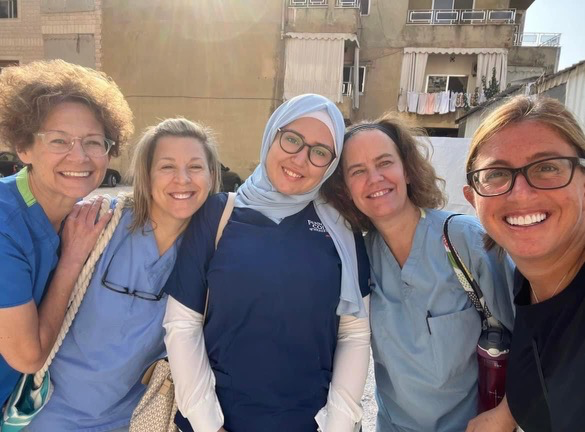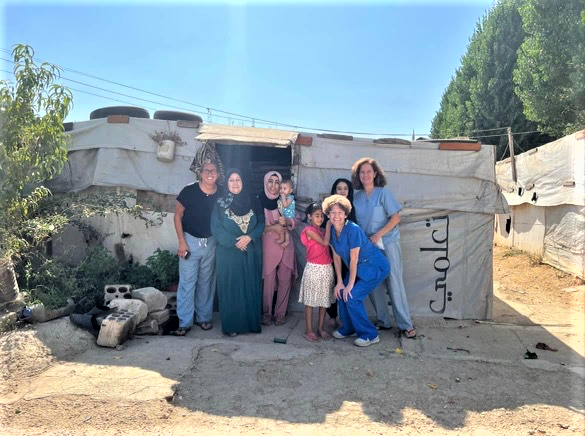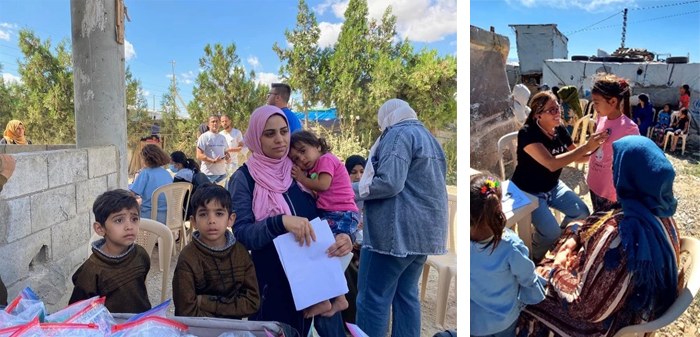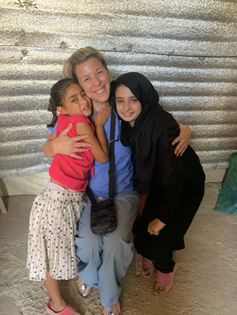Case Study
Dec 19, 2022
Inspiration Project: In Beirut, ‘A Whiplash of Emotions and Encounters’
The Inspiration Project is an annual scholarship that enables up to six attorneys and staff to pursue a life-long dream, inspiration, or experience focused on health, wellness, lifelong learning, or community impact. Sponsored by Seyfarth Life, the initiative launched in 2019 and is the legal industry’s first inspiration-focused employee wellness program designed to increase engagement and enrich the firm's culture. We would like to thank Kim Schwegel and all the participants for agreeing to share their journeys.
Kim wrote about her experience volunteering in Beirut, Lebanon, immediately upon her return. We followed up with her a few weeks later for a Q&A. It follows her narrative.
While I was initially awarded the Seyfarth Life grant to volunteer in a medical clinic in Nairobi, Kenya, I subsequently received permission to change the location to Syrian refugee camps near Beirut. The Seyfarth Inspiration Project donation covered two plane tickets, a microscope for a women’s clinic, and almost $2000 toward prescription medications. My friend Jen, an ER doctor, and I spent considerably more for room and board, over-the-counter medications, translators, security, and a bit of tourism. It really is a privilege to be able to afford this kind of trip. I’m incredibly grateful.
Jen and I just returned this week. Everything still feels surreal. I think it may take a great deal of time to process. While I had anticipated the hardships in the Syrian refugee camps, I had not fully understood the extent to which Beirut itself, once dubbed the Paris of the Middle East, had also fallen apart. The 2020 explosion destroyed a third of the city. The banks have since collapsed. There are posters throughout the city of the Ayatollah and Vladimir Putin. The corruption, particularly under Hezbollah, is overwhelming. The power goes out during the day. There really isn’t any functioning government. People can collect only a fraction of their salaries. The currency is practically worthless. It was really sad. Almost everyone I met had either arranged to leave the country, or desperately wanted to do so.

Our volunteer group was formed by a Lebanese American doctor who had worked with Jen for years at Edward Elmhurst Hospital in the Chicago suburbs. Besides this doctor and my friend Jen, we traveled with two American dentists (who pulled teeth the entire week) and their dental hygienist wives, and two American nurses. For the week’s medical clinic, we hired two Lebanese pharmacists (both of whom spoke English), a Lebanese interpreter for Jen, and several Lebanese bodyguards. I worked as a pharmacy tech, counting pills and labeling baggies for pharmacy orders as fast as I possibly could out of six suitcases.
Generally, we saw more than 200 patients per day, setting up on the outskirts of the various refugee camps. When we arrived, the waiting patients would trill this high pitched noise to show their excitement. They would dress up for our arrival. We were invited inside the tents of a few families in various camps, most of whom had resided there for well over a decade. Typically, multiple families lived in each home (hard floors, some cushions, little to no possessions) and had a shared tank of water. The refugees were permitted to reside in the camps if they worked the farms (no salary) and paid rent. This meant that everyone able worked, including the children. Those we met who were unbelievably bright and understood their entrapment were the hardest to face. So much wasted potential and no options for real jobs or resettlement.

For some reason, my extraordinary personal experiences each day in the camps feel private right now -- both those that were warm, often funny, and wonderful, and those that were scary, uncomfortable and unbelievably sad. I felt something that I can only describe right now as a whiplash of emotions and encounters. Shame about my personal comfort, hygiene, and financial excess. Gratitude to many good people who do so much to help. Horror at stories of brutality and inhumanity. Admiration for the less fortunate who survive, and find moments of joy, despite their extreme hardships. Visions of bombed out buildings and tent communities around one corner, and mind-blowing wealth around another. Survival of the fittest. Then charity and kindness.
During law school, my grandmother insisted that I schedule a visit to her friend, a US district court judge named Abraham Lincoln Marovitz. During the visit, the judge, who died shortly after I began practicing law, held both of my hands in his. He told me that he had one piece of advice, not just for my legal career, but for my life. He asked me to try my best to do one “mitzvah” a day, any good deed, no matter how small, and to show others compassion to the best of my ability. I vaguely recall counting the minutes until my obligatory visit with the sweet old guy could conclude, and trying not to laugh at an autographed painting in front of me by Ann Landers that said something like, “You’re not too old and I’m not too rich.”
Thirty years later, I can feel the strength of his words. Every day, try to do something for someone else. Say something nice, build someone up, do something good, make someone’s life easier, make the world a better place. Make that choice. Teach your children to do the same. It will fill your bucket and enrich your life.
A Q&A With Kim
Describe a typical workday?
We stayed in a church in a city called Zahle. The church had hotel-like rooms upstairs for visiting medical teams. We’d wake up pretty rested because of the Ambien Jen brought us. Because the power went out around midnight and, thus, the air conditioning, we used the drug to sleep through the heat. It was pretty miraculous and worked scarily well. One night I had to pry Jen’s cell phone from her death grip fingers after she took the Ambien. I worried her hand would cramp. The church had breakfast waiting for us when we awoke. Then, the dentists would remain on site because they needed a sterilized location for their extractions. The medical team and crew, which included Jen and me, would get picked up in two vans. One van had all the tables and chairs tied on top. We’d drive out to the Syrian refugee camps, generally about 45 minutes away, and set up outside on the outskirts of the camps. We set up the “pharmacy” tables with the six suitcases of medications, and the “examination” tables for the doctors.

People would line up and wait for their turn to speak with the doctors. The doctors would write a script, and then the pharmacists and I would fill the orders. There were more than 100 different medications (GI, diabetes, heart, antibiotics, pain, creams, etc). The other pharmacy tech and I would fill and label tiny plastic bags with the appropriate kind and number of pills, and the Lebanese pharmacists would advise the patients in Arabic. At two camps, people invited us into their makeshift homes. We’d usually go somewhere as a team for a very quick lunch and then to another camp in the afternoon. We’d see about 200 patients a day, sometimes more, so we worked as fast as we possibly could to serve as many people as we could. At night, the American team would go to a fun dinner, sometimes local and sometimes not. A few restaurants were so upscale that it felt like we were traveling in a different universe. We’d get back to our room pretty late, shower off all the dust, and then type out notes and send pictures to our families on What’s App with our first WIFI of the day.
Were there experiences that especially impacted you?
Two in particular stand out. First, before I went on the trip, I had wanted to bring children’s books in Arabic for the kids in the refugee camps to help fight the illiteracy problem. I was asked to wait until after my trip to make decisions on any donation beyond medications. Because I know that a well-intentioned good Samaritan can inadvertently cause harm, I thought I understood. And then I got there. These people have nothing. No toilet paper, no feminine products, no plumbing. No privacy, no rights, no recourse for injustices against them. They work hard to have a tent, a large metal container of water, food, and gasoline for one small, fairly useless, makeshift furnace for winter. All I wanted to give them was cleanliness and bodily comfort. From what I understand, they have no hope of resettlement. I realized that they don’t need children’s books. They need any possible assistance anyone, including me, can provide to initiate large-scale international intervention. The second interaction occurred on our last afternoon in a Syrian refugee camp on a home visit.

I met a little girl – the one on the left in the pink shirt (above) – that I wished I could take home with me. She was hilarious. She pulled her father’s pants leg up to proudly show us his giant tattoo. He was appalled. She pulled my arm until I agreed to see her treasure (a newborn baby in the next tent). She ignored the reprimands from her family and made everyone laugh with her exuberance. She literally attacked me with love, attaching her entire body to me the whole visit. That’s a real smile on my face. I have a little flower petal she gave me in the back of my phone case. I can’t seem to articulate why she had such a huge impact on me. I guess she made the people feel like a “we” not a “them” if that makes sense. I hope nothing in her hard life takes the sparkle from her.
How has the experience changed you?
I’m not sure it’s changed me. If anything, it’s given me the opportunity to see my personal challenges with a renewed perspective.